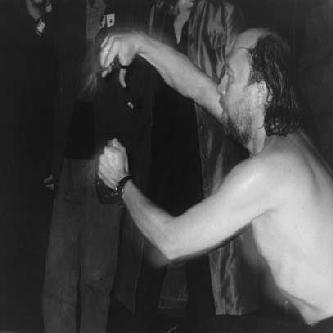Victor Petrov
Minsk, Byelorussia
artist, curator
www
Victor Petrov
Minsk, Byelorussia
artist, curator
www
Performance is art which lies within a process, but one can assume that this process extends throughout the whole of our conscious existence, irrespective of the circumstances. Performers live out their entire lives in an eternal creative process which is invisible to the uninitiated. Their emotions belong to and emerge from this creative process. This means that the time performers possess will continue for longer than the actual performance. Consequently, by transferring several events into the text, I continue to relive the performance, and am back inside the process. Anyone who reads a text related to the events is unwittingly drawn into that creative process, thus proving that it does exist and is necessary. Of course, a free interpretation only expresses the author's point of view of events once they have been witnessed. However, nothing is wrong if you have a diametrically opposite opinion, because processes arise from these contradictions. One cannot agree with everything.
Being an event, a performance implies activity from both sides, so those who attend are its co-participants. It is a system which seeks, disintegrates and regenerates itself, whilst repelling any foreign bodies. The people who come to the event for narcissistic reasons and use it purely to reconfirm their own ambitions begin to realise that the performance is not for them. Those who go to the festival (they could theoretically be termed an audience) are mostly people on a quest to find their place in the world, people who have lived through turbulence in their personal and creative lives, those who seek to develop spiritually, or people who are demanding and do not require idle entertainment. Therefore, many people who couldn't make it to the festival for whatever reason will also be, more or less, participants and an "audience".
In fact, a festival's audience is much wider than any participant or spectator present at the actual event. A festival is passed on orally from person to person, thus changing our lives and visions of life. We discover ourselves through the new people and performers we see, share their experience of culture, views on life, and their attitudes to the world and its ways. A festival does not lead to silence, it is imprinted into peoples souls and alters their opinions about our lives. It often provokes negative reactions from the press, which is generally incapable of understanding anything or grasping any of the processes taking place in modern art. As a result, it seizes hold of itself, so revealing its true face of total incompetence and aggression.
Incidentally, none of the journalists covering the event attempted to talk openly with the performers. I don't think any of them even went to the performances, hence their articles with headlines like "Festival of Outrage", "Scary And Fun At The Same Time", etc. In the main, this stems from their elementary disrespect for human individuality, plus a desire to make a name for themselves at someone else's expense. I think similar things happen everywhere, not just in Belarus. Unfortunately, all this is far removed from the real events of the performance itself because real art, like text, is not just empty decoration, but mutual work and dialogue which gives birth to new ideas. It is alive with thoughts and energy, and stimulates action and creativity.

Spirit: Flesh: Performance:
I never see beforehand, what it could be ultimately. But I firmly believe that is the contact with audience and also with those who have not come to the performance. Anyway, the act of shamanism has to take place. This is the attempt to show to others as well to myself, that at different times and in different manners we all feel instinctively the changes that are coming. But what could we take away? Our feelings? ... Our Emotions? ... Dreams?"